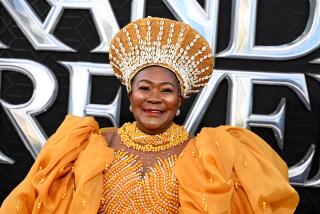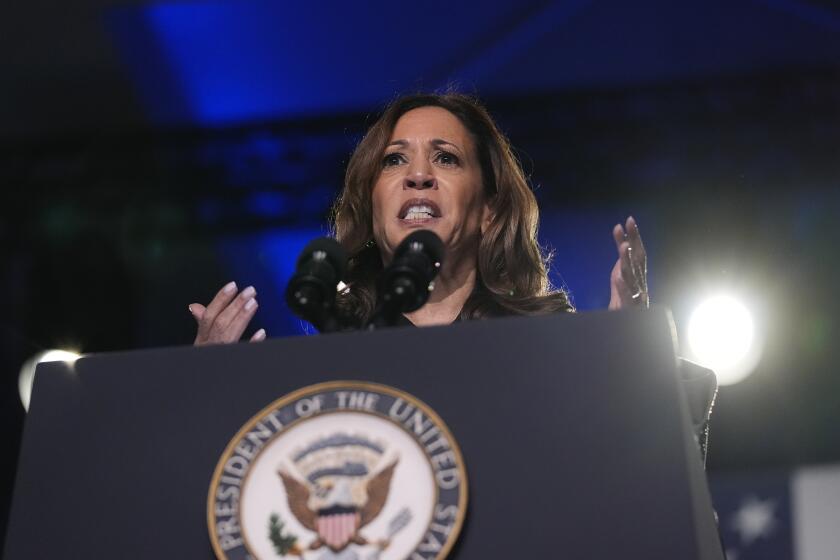At Nelson Mandela’s last goodbye, music soars and then he’s gone
QUNU, South Africa — When South African President Jacob Zuma stood at the microphone before a sea of mourners, the first notes of his unexpected song for liberation hero Nelson Mandela were lonely and poignant.
But the magic of the answering harmony of the mourners rose under a soaring, domed black ceiling that looked something like a night sky. It was a moment of pure joyful melody, richer and more dramatic than television could convey to South Africans in townships and cities who watched on big screens in soccer stadiums and parks or at home on television.
The song, “Thina Sizwe,” is a struggle-era song that conveyed much of what Mandela stood for, a mournful demand for the return of black land stolen by whites: “Children are crying for the nation which was taken by the white people.”
PHOTOS: Nelson Mandela through the years
When Zuma and Mandela were fellow prisoners on Robben Island, Zuma was known as the one who always sang sweet melodies to keep prisoners’ spirits up.
Zuma was introduced by a traditional praise poet clad in leopard skin, who shouted out verse exuberantly, reminding the mourners of the president’s importance. Zuma stood to one side, chuckling, at times looking abashed, and then stepped forward to sing amid cheers and whistles of support.
The vast hall was hung with six enormous golden lanterns, reflecting the golden glow cast by 95 candles along the stage, lighted at dawn. White flowers decked the stage where several golden arches rose.
In a tent the size of a football field, the figures standing on stage looked dwarfed, and three screens above the stage magnified the event for mourners.
FULL COVERAGE: Anti-apartheid icon Nelson Mandela dies
Dignitaries and heads of state sat on leather chairs directly in front of the dais where Mandela’s flag-draped coffin was placed. The sea of purple plastic chairs arrayed around the VIP area were marked for veterans of Mandela’s ruling African National Congress, the ANC woman’s league, armed services and others. On each lay a program of events and a bottle of water.
The state funeral was marked with soaring musical high notes, beginning with the national anthem and then Zuma’s rendition of “Thina Sizwe.” As soon as Zuma’s speech finished, mourners leaped to their feet and sang another struggle song, “Nelson Mandela,” whose words translate to say “There’s no one like you.”
Men wore dark suits, some with leopard skins draped over their shoulders, showing that they were chiefs of the AbaThembu clan. Women wore black dresses, some of them full-length, and hats, some pillboxes and others as big as platters.
Other women were decked out in the ANC colors of black, green and gold. A large section on one side of the tent was reserved for members of the armed services.
PHOTOS: South Africa says goodbye to Nelson Mandela
At times the mood was jovial, as when Deputy President Cyril Ramaphosa smoothed over awkward moments and tried to hurry the program along so that Mandela could be buried when the sun was at its zenith and shadows at their smallest, in a mark of his stature.
At times it was emotional, as when Malawian President Joyce Banda dramatically departed from her speech to tell the audience that political enemies had isolated her, humiliated her and tried to assassinate her to prevent her becoming the country’s president.
“I found myself in a situation where I had to work with those same people who had [tried to] prevent me from becoming president of my country. I had to forgive — but I had to forgive without any effort, because my Madiba had prepared me,” Banda declared, using Mandela’s clan name, sending ripples of surprise through the mourners.
At times the mood was sorrowful, as when one of Mandela’s oldest friends, fellow Robben Island prisoner Ahmed Kathrada, described the last time he saw Mandela alive in hospital and how the man who was like an “elder brother” squeezed his hand.
In the cavernous tent, Kathrada’s voice was barely audible and Ramaphosa adjusted the microphone closer to Kathrada’s mouth.
Even so, his voice, frail and quavering, descended almost to a whisper as he described his devastation: “I have lost a brother. My life is a void.”
A beautiful, honeyed hymn accompanied Mandela’s casket as it left the tent, borne uphill on a gun carriage to be buried.
The 21-gun salute thudded loudly, the Last Post sounded.
And he was gone.
Twitter: @latimesdixon
More to Read
Sign up for Essential California
The most important California stories and recommendations in your inbox every morning.
You may occasionally receive promotional content from the Los Angeles Times.










